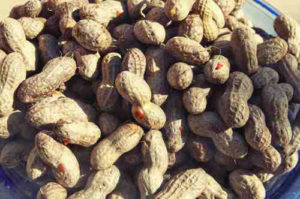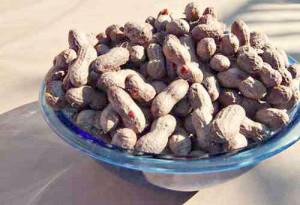 A big part of the trip to Morehead each summer was the drive down US-70 from Durham. This drive, for which I often played the role of passenger with my grandmother, was not complete without a few stops. One at King’s in Kinston for barbeque, one for a watermelon from a stand in LaGrange, and one for boiled peanuts, from a road stand near that one ridiculously big house that my grandma loved to gawk at and would openly wonder why on earth anyone even needed a house that big let alone a personal lake with a gazebo (for the record, if the owner’s of that house happen to read this, Bobbie was a sweet woman who loved, above all else, to gossip. And for what exactly DO you use that gazebo?).
A big part of the trip to Morehead each summer was the drive down US-70 from Durham. This drive, for which I often played the role of passenger with my grandmother, was not complete without a few stops. One at King’s in Kinston for barbeque, one for a watermelon from a stand in LaGrange, and one for boiled peanuts, from a road stand near that one ridiculously big house that my grandma loved to gawk at and would openly wonder why on earth anyone even needed a house that big let alone a personal lake with a gazebo (for the record, if the owner’s of that house happen to read this, Bobbie was a sweet woman who loved, above all else, to gossip. And for what exactly DO you use that gazebo?).Boiled peanuts have been a Southern tradition for generations. A favorite way to cook and consume green (young) peanuts, their origins are thought to lie in Africa, making them another cherished food tradition brought to the South by the slave trade. A low and slow boil in salted (and seasoned, if you like) water renders hard young peanuts into delicious crunchy snacks that are the perfect accompaniment to a hot Southern summer afternoon.
 On a recent trip to Brunswick County I picked up a big bag of green, farm fresh peanuts and boiled them up with red pepper flakes, salt, and a pinch of chipotle. After simmering for a few hours they were tender and delicious. I sat on the front porch of the Swamp House peeling the skins away with my teeth, slurping the spicy juice, and crunching on the nuts. Sipping on a cold beer and watching the pinfish jump through the marsh, it was the perfect way to end the summer.
On a recent trip to Brunswick County I picked up a big bag of green, farm fresh peanuts and boiled them up with red pepper flakes, salt, and a pinch of chipotle. After simmering for a few hours they were tender and delicious. I sat on the front porch of the Swamp House peeling the skins away with my teeth, slurping the spicy juice, and crunching on the nuts. Sipping on a cold beer and watching the pinfish jump through the marsh, it was the perfect way to end the summer.________________________________________________________
1 lb fresh green peanuts
2 quarts water
1/2 cup kosher or sea salt
1 tbsp red pepper flakes
1 tbsp chipotle spice
Combine all ingredients in a large pot. Boil for 3-5 hours, or until peanuts are tender. Strain and serve.
Southern food writer, photographer and lover of pie, Elena is from Durham, NC. Read more about Elena’s food adventures on her blog, Biscuits and Such.
There is no I-70 in North Carolina. I-70 is way north and runs from Utah to Maryland. U.S. 70, much of which is freeway, runs from eastern Carteret County through Beaufort and Morehead City, then to New Bern, Goldsboro, Johnston County, Raleigh and Durham.
Thanks, Susan, for catching us on that one! You are correct. It’s US-70 and that has been corrected in the post.
Best,
North Carolina Folklife Institute